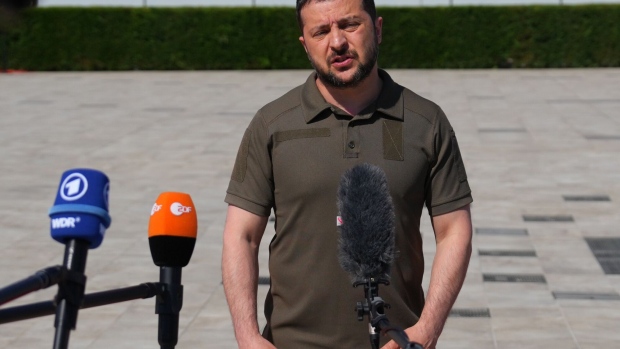Jun 1, 2023
France and Germany Are Split Over Ukraine’s Appeal to Join NATO
, Bloomberg News

(Bloomberg) -- France is pushing for a concrete path for Ukraine to join the NATO military alliance, but Germany is urging more caution about discussing membership in light of Russia’s ongoing war.
France’s wish “is that we clearly design a path with stages and progressions so that Ukraine can, when the time comes, join us in good security conditions,” Foreign Minister Catherine Colonna said in an interview on the sidelines of a gathering of NATO counterparts in Oslo. “Will there be dates or a calendar, I’m not sure because there are still many points to discuss.”
While Ukraine joining NATO is “not something for today,” Colonna said, “we need to do more than 2008,” referring to an agreement that year by allies that Ukraine would eventually join.
By contrast, Germany’s Annalena Baerbock told reporters “it’s clear that we cannot talk about a new membership in the middle of a war.”
The North Atlantic Treaty Organization is contending with how to deepen ties with Kyiv without immediately bringing Ukraine into the fold as a member, given that the bloc’s Article 5 security guarantees could draw allies into Russia’s war against the country.
The top envoys are addressing the question of membership at their two-day meeting in Oslo, which started Wednesday, in advance of a NATO summit in July when leaders will sign off on a broader package of long-term support for Ukraine.
Ukrainian President Volodymyr Zelenskiy has called for clear signals in support of his country’s membership at the July summit, urging allies to provide a more concrete perspective beyond the 2008 statement. But opinions differ about how specific allies should be.
“Security guarantees are very important not only for Ukraine but also for our neighbor Moldova because of the Russian aggression in Ukraine and potential aggression in other parts of Europe,” Zelenskiy told reporters in Moldova on Thursday, at the start of a European Political Community meeting.
‘Coalition of Patriots’
Zelenskiy said he would discuss a “coalition of patriots” and “strong support on the battlefield.” Ukraine recently received “Patriot” air defense units from its western partners.
Colonna’s comments come a day after French President Emmanuel Macron advocated for “a path toward membership” for Ukraine to NATO. The comments were a welcome surprise for Baltic nations, which have been pushing for a more concrete road map for Ukraine’s membership, according to an official from one of the countries.
While the US has repeatedly backed the 2008 statement about Ukraine’s prospects and is looking to ensure a stronger political relationship with Kyiv, it’s unclear whether that will necessarily involve providing Ukraine with a timeline to membership, a senior US official said.
NATO Secretary General Jens Stoltenberg told reporters Thursday he’s “confident we will find consensus on the way forward and we’ve had good informal discussions already and we agree on core messages.” He added that “all allies agree that Ukraine will become a member of this alliance and Ukraine is moving closer to NATO.”
Upgrading Ukraine’s Ties
As part of the Vilnius package, allies are expected to upgrade the formal status of NATO’s relationship with Ukraine with a new NATO-Ukraine Council, allowing the country to directly take part in broader discussions about the alliance’s security.
NATO leaders are also expected to agree to a long-term fund with a total of €500 million ($534 million) a year to help Ukraine with non-lethal aid and other support. The aim is to bolster Ukraine’s own defenses to deter Russia from attempting another invasion after the current war ends, with recent plans by allies to train pilots on F-16 fighter jets fitting into that long-term goal.
The fund, among other things, would finance efforts to modernize Ukraine’s military, including by rebuilding military infrastructure or training soldiers on how to use and maintain modern equipment, thereby keeping readiness high. While the fund has already received hundreds of millions of euros this year, allies may struggle to provide the same level of support over the long term given that commitments are not locked in for future years.
Security Guarantees
Kyiv has also demanded effective bilateral security guarantees before it becomes a full member. Stoltenberg remarked recently that a commitment by a large ally could very closely resemble the Article 5 collective security commitments.
Under the Kyiv Security Compact, a proposal drafted by former NATO Secretary General Anders Fogh Rasmussen and Zelenskiy’s chief of staff Andriy Yermak, allies would commit to enabling Ukraine’s self-defense with binding commitments to provide the necessary military and non-military resources.
Macron appeared to back such a proposal Wednesday when he urged allies to provide Ukraine with “tangible, credible security guarantees” — somewhere between those similar to what is offered by the US to Israel and “full-fledged NATO membership.” Colonna said “numerous” countries are reflecting on what they could offer in terms of security guarantees and considering different formats.
Ukraine is preparing a much-anticipated counter-offensive, armed with billions of dollars’ worth of European and US weapons. Kyiv may seek to launch the counter-punch ahead of the leaders’ summit in July, in an effort to convince allies that further military support is warranted.
--With assistance from Ott Ummelas, Katharina Rosskopf, Iain Rogers, Michael Nienaber, Andra Timu and Irina Vilcu.
©2023 Bloomberg L.P.






